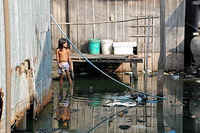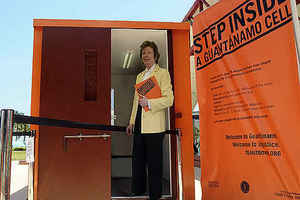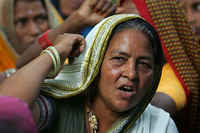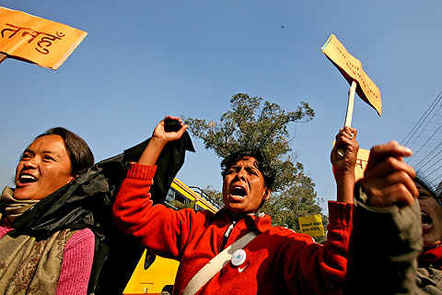Amnesty International Report 2009
IT’S NOT JUST THE ECONOMY, IT’S A HUMAN RIGHTS CRISIS
...Skyrocketing food prices are leading to more hunger and disease, forced evictions and foreclosures to more homelessness and destitution
Irene Khan, secretary general Amnesty International
In September 2008 I was in New York to attend the UN high-level meeting on the Millennium Development Goals (MDGs), the internationally agreed targets to reduce poverty by 2015. Delegate after delegate talked about the need for more funds to eradicate hunger, to cut preventable deaths of infants and pregnant women, to provide clean water and sanitation, to educate girls. The life and dignity of billions of people were at stake, but there was only limited will to back up the talk with money. As I left the UN building I could see the ticker tapes running a very different story coming from another part of Manhattan: the crash of one of the largest investment banks on Wall Street. It was a telling sign of where world attention and resources were really focused. Rich and powerful governments were suddenly able to find many more times the sums that could not be found to stem poverty. They poured them with abundance into failing banks and stimulus packages for economies that had been allowed to run amok for years and were now running aground.
By the end of 2008, it was clear that our two-tier world of deprivation and gluttony – the impoverishment of many to satisfy the greed of a few – was collapsing into a deep hole.
As with the case of climate change, so too with global economic recession: the rich are responsible for most of the damaging action, but it is the poor who suffer the worst consequences. While no one is being spared the sharp bite of the recession, the woes of the rich countries are nothing compared with the disasters unfolding in poorer ones. From migrant workers in China to miners in Katanga in the Democratic Republic of the Congo (DRC), people desperately trying to drag themselves out of poverty are feeling the brunt sharply. The World Bank has predicted 53 million more people will be thrown into poverty this year, on top of the 150 million hit by the food crisis last year, wiping out the gains of the last decade. International Labour Organization figures suggest that between 18 and 51 million people could lose their jobs. Skyrocketing food prices are leading to more hunger and disease, forced evictions and foreclosures to more homelessness and destitution.
Find a country or regional report
People were subjected to forced evictions in at least 24 countries





